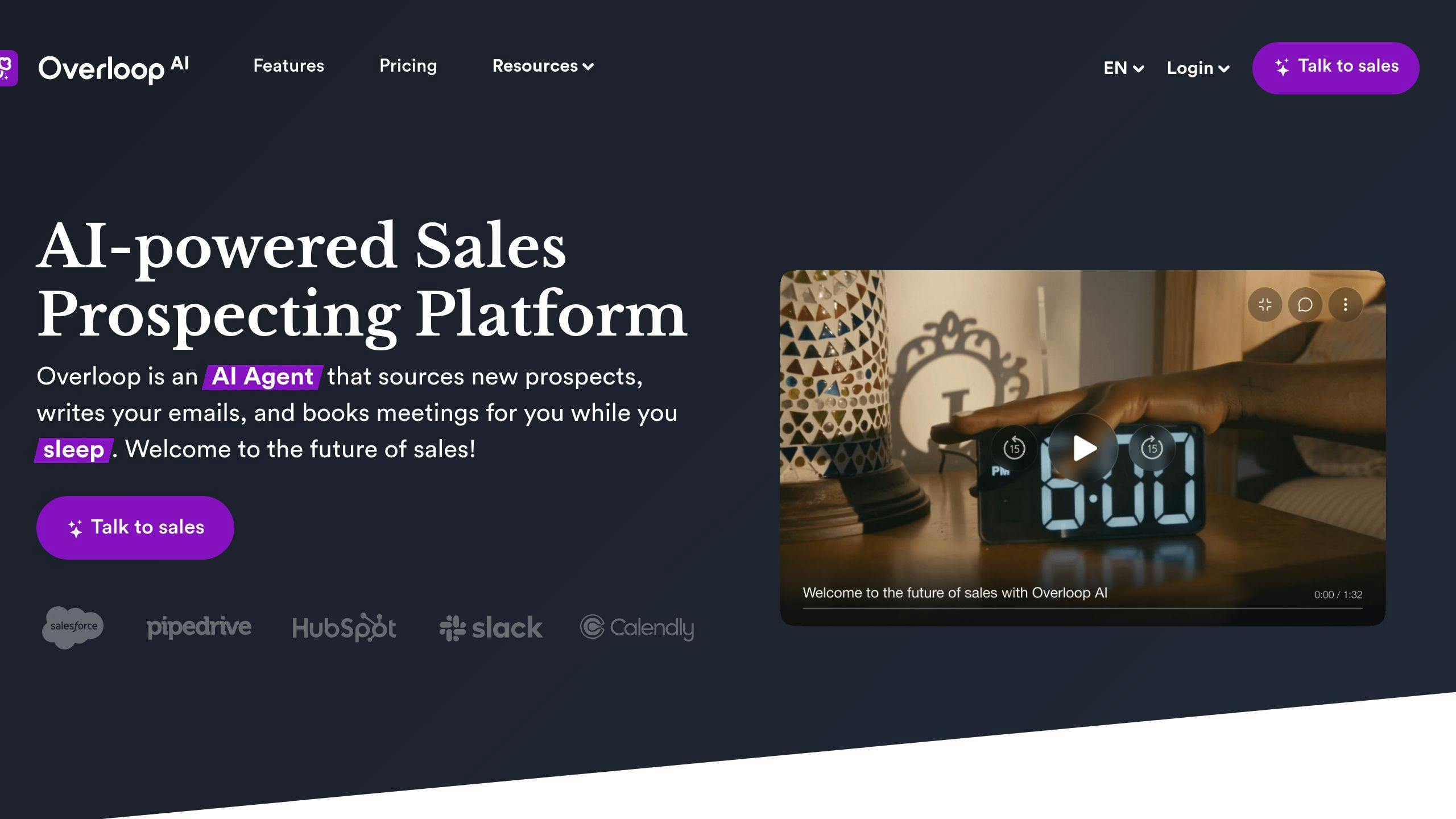AI is helping businesses achieve 3-15% revenue growth and 10-20% ROI increases by automating repetitive tasks, personalizing outreach at scale, and delivering accurate insights. Here’s how it works:
- Saves Time: Automates manual tasks like lead sourcing and data entry, saving up to 4,000 hours/month.
- Boosts Personalization: Customizes customer interactions, increasing response rates and conversions.
- Improves Forecasting: Provides real-time, data-driven insights for better decision-making.
Companies using AI tools like Overloop AI report 20% better forecast accuracy, 15% shorter sales cycles, and larger deal sizes. By integrating AI effectively, businesses can streamline workflows, enhance productivity, and drive long-term sales growth.
Algomarketing boosts sales ROI through AI-powered decision making at Cisco
Common Sales ROI Challenges
Sales teams often encounter obstacles that directly affect their return on investment (ROI). Recognizing these issues is key to leveraging AI solutions that can reshape how sales operations work.
Manual Processes and Lost Productivity
Relying on manual tasks drains time and resources, cutting into ROI. Automating activities like lead sourcing, data entry, and workflow management with AI can save up to 4,000 hours each month. This lets sales teams concentrate on activities that drive revenue [2].
Impersonal Outreach
Using generic messages can hurt sales efforts. AI-powered tools allow for customized outreach, helping sales reps build stronger customer relationships. In fact, personalization can increase revenue by 3-15% [3].
"AI is not just a buzzword; it is a robust tool that is changing the way sales teams approach their goals." - Trendskout [1]
Inaccurate Data and Weak Forecasting
Bad data leads to poor decisions and unrealistic goals. Incomplete customer profiles, outdated market trends, and unreliable sales forecasts result in misaligned efforts and wasted resources. AI provides accurate, real-time insights, enabling better planning and smarter decisions. This breaks the cycle of missed quotas and inefficient targeting.
These hurdles emphasize the value of AI in automating workflows, creating personalized customer interactions, and delivering precise insights, all of which can significantly improve sales ROI.
One of the solutions is using a CRM system to ensure accurate data and reliable forecasting. By centralizing customer information, tracking interactions, and maintaining up-to-date records, a CRM system provides a solid foundation for building complete customer profiles and making informed decisions. When paired with AI, a CRM system can further enhance forecasting accuracy, offering real-time analytics and actionable insights to align efforts and drive better outcomes.
AI's Role in Improving Sales ROI
Automating Repetitive Tasks
AI platforms take over routine tasks, allowing sales teams to concentrate on closing deals and building relationships. For instance, Overloop AI handles lead sourcing and email personalization, making workflows more efficient. By automating tasks like email campaigns and lead management, tools like Overloop AI help teams save time and improve productivity, leading to better ROI over time [1].
Personalization at Scale
AI makes it possible to deliver personalized outreach on a large scale by analyzing extensive customer data. This approach has been shown to drive a 10-20% increase in ROI [3]. Modern AI systems craft highly relevant communications that connect with prospects, offering a level of customization that was once unachievable at scale.
Better Data Insights and Forecasting
AI tools process sales data to provide insights that improve decision-making. These tools help sales teams by:
- Generating precise sales forecasts using historical data
- Identifying high-value opportunities with lead scoring
- Allocating resources more effectively
- Analyzing market trends and customer behaviors
Businesses using AI for these tasks have reported revenue growth of 3 to 15 percent [3]. This success comes from AI's ability to guide sales efforts toward the most impactful opportunities. These insights not only enhance day-to-day operations but also set the stage for sustained growth and improved ROI [1].
AI Technologies Boosting Sales ROI
Data Enrichment for Lead Profiles
AI platforms can analyze massive amounts of data to build detailed lead profiles, ensuring sales teams have accurate and current information at their fingertips.
For example, Overloop AI taps into a database of over 450 million contacts to provide verified data for lead enrichment. This enables sales teams to zero in on high-potential prospects, increasing efficiency and maximizing ROI.
A telecommunications company leveraged AI for customer profiling and saw a 20% jump in average deal size by identifying better upsell opportunities [4].
Conversation Analysis for Coaching
AI tools are changing the game for sales coaching by analyzing calls and emails. These tools uncover insights like the best times to reach out, buyer preferences, and techniques that close deals faster.
One tech company used AI to study buyer behavior and fine-tune their outreach strategy, cutting their sales cycle by 15% [4].
Automated Campaign Management
AI simplifies managing multi-channel campaigns by improving forecast accuracy, optimizing outreach timing, and scaling effective strategies. In fact, these tools have been shown to boost forecast accuracy by 20% [4].
These AI-driven solutions not only provide immediate benefits but also set the stage for long-term sales growth. From enriching lead profiles to streamlining campaigns, they consistently deliver strong results in a variety of industries.
That said, the key to reaping these benefits lies in implementing these technologies effectively.
Implementing AI for Long-Term ROI Growth
Steps to Integrate AI Tools
To get started with AI, focus on pinpointing inefficiencies in your current workflows and setting clear, measurable goals. Successful integration usually involves three main phases:
- Analyze workflows: Identify bottlenecks and define specific goals for improvement.
- Choose AI tools: Look for tools that match your business needs and objectives.
- Test with pilots: Run small-scale pilot programs to evaluate the impact before rolling out on a larger scale.
Following these steps helps ensure AI adoption leads to measurable ROI growth over time.
Of course, introducing AI isn't without its hurdles. Addressing these challenges early is key to long-term success.
Addressing Adoption Challenges
Here are some common obstacles businesses face when adopting AI and how to tackle them:
| Challenge | Solution |
|---|---|
| Resistance to Change | Offer training and show immediate benefits |
| Data Integration Issues | Ensure smooth CRM and system integration |
| Learning Curve | Provide ongoing learning opportunities |
Once these challenges are resolved, the focus shifts to selecting the right AI platform.
Selecting the Right AI Platform for Sales
When evaluating AI platforms, it’s important to focus on features that align with your business needs. Key considerations include:
- Integration capabilities: How well it fits with your current tech stack.
- Scalability: Can it grow with your business?
- Data security: Ensures sensitive information is protected.
- Customer support: Reliable support for troubleshooting and guidance.
Platforms like Overloop AI are great examples, offering tools that enhance sales efficiency while being easy to use. The best platforms not only integrate seamlessly with your existing systems but also provide clear metrics to track improvements in productivity, conversion rates, and revenue.
Examples of AI Improving Sales ROI
Overloop AI Case Study

Overloop AI showcases how combining automation with personalization can boost sales performance. A tech company using its AI-powered tools cut prospecting time by 40%, saw higher email response rates, and improved lead quality. This was achieved through streamlined workflows and smarter targeting.
This example highlights how AI-driven features like automation, personalization, and data analysis can directly lead to better ROI by making prospecting more efficient and boosting customer engagement.
Other AI Success Stories in Sales
Businesses across various industries are leveraging AI to achieve impressive outcomes:
| Industry | AI Use Case | Results |
|---|---|---|
| Manufacturing | Forecasting with AI CRM | 20% improvement in forecast accuracy |
| Tech Services | Buyer behavior analysis | 15% reduction in sales cycle duration |
| Telecommunications | Upsell analytics | 20% increase in deal sizes |
For example, a manufacturing company used AI-driven analytics to allocate resources more effectively, helping them hit revenue targets consistently [3][4]. Meanwhile, a telecommunications provider analyzed customer data patterns with AI, enabling them to close larger deals without adding extra staff [4].
These examples show how tools like data enrichment and campaign management can transform sales processes, paving the way for continued ROI growth.
Conclusion: AI's Role in Sales ROI
AI is reshaping sales ROI by tackling core challenges and delivering measurable improvements in how businesses operate. From boosting efficiency to enhancing accuracy and increasing revenue, the impact of AI is being felt across various industries.
Here’s how AI is driving these changes:
| Area | Impact | Outcome |
|---|---|---|
| Process Automation | Simplified workflows | Better productivity |
| Data Analysis | Smarter decision-making | Greater precision |
| Customer Engagement | Personalized interactions | More conversions |
These results show how AI is helping businesses address immediate hurdles while also paving the way for growth. Industries like manufacturing and telecommunications are already seeing improvements in forecast accuracy, shorter sales cycles, and larger deal sizes thanks to AI.
Take Overloop AI, for example. This platform highlights how integrated AI tools can optimize different parts of the sales process, creating a ripple effect of efficiency that directly boosts ROI. By starting with specific challenges and gradually expanding AI use, companies can maximize its benefits.
AI isn’t a quick-fix solution but a strategic ally for long-term sales success. With its ability to automate tasks, provide actionable insights, and personalize at scale, AI is becoming a must-have for modern sales strategies [1][2].
FAQs
How does AI help increase revenue?
AI plays a major role in boosting revenue by using predictive analytics to create accurate forecasts and analyzing large data sets to identify patterns and opportunities. It helps businesses make smarter decisions and optimize their sales processes.
Here are some key ways AI impacts revenue:
| Revenue Driver | AI Implementation | Impact |
|---|---|---|
| Lead Generation | Automated sourcing and qualification | Higher conversion rates |
| Sales Efficiency | Task automation and personalization | Increased productivity |
| Forecasting | Data-driven analysis | Better resource allocation |
"AI's predictive analytics provides more accurate forecasts, helping sales teams set realistic targets and allocate resources effectively" [1][3].
By automating tasks, AI allows businesses to scale personalized interactions and gain actionable insights for better decision-making. For instance, automating repetitive tasks like lead qualification can deliver quick, noticeable results [1][2].
Platforms such as Overloop AI highlight these benefits by automating lead sourcing, tailoring outreach, and optimizing campaigns with data-driven insights. This frees up sales teams to focus on high-priority tasks while ensuring steady growth [1].



